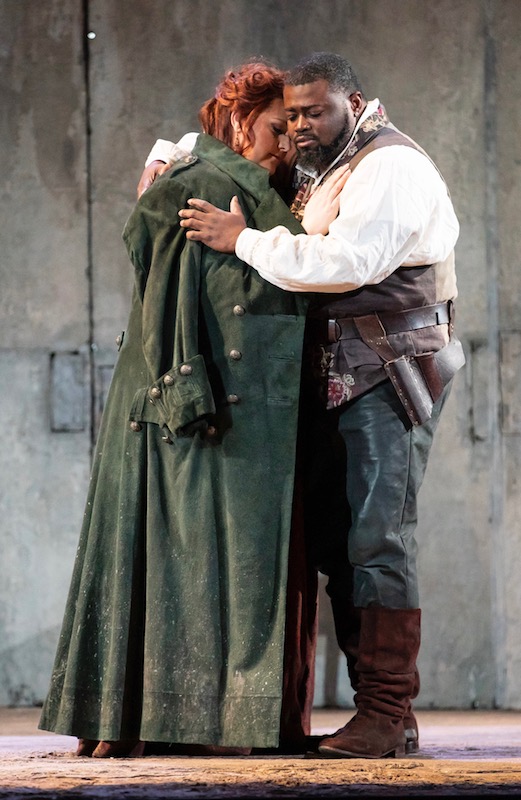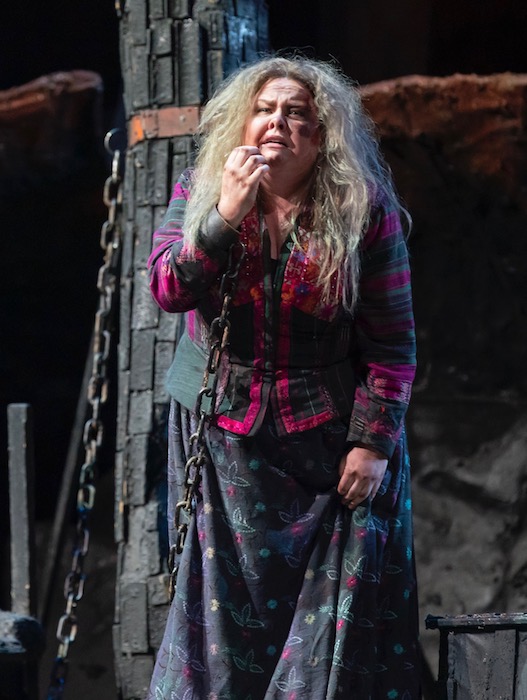Big voices bring visceral Verdi thunder to Lyric’s “Trovatore”
Babies thrown on pyres, mixed up infant brothers, a mysterious gypsy hag, a troubadour imprisoned in a castle tower, violent duels, executions, suicide by poisoning, singers with anvils, and some really problematic family relationships.
Il Trovatore has come in for much lampoonery in the 165 years since its premiere in Rome. That’s due as much to the bewildering backstory complexities of this love triangle set amid warring factions in 15th century Spain, as for the multitude of oddball elements that virtually define the extremes and absurdities of grand opera. For those who first came to this music via the Marx Brothers’ wholesale demolition of Trovatore in A Night at the Opera, it’s still impossible not to smile at the opening bars.
Yet for all its implausible weirdness, Il Trovatore also contains some of Giuseppe Verdi’s grandest, richest and most varied music from curtain to curtain. All the opera needs, as has often been noted, is a quartet of world-class singers to deliver the goods.
Lyric Opera’s current revival, which opened Saturday night, provides that and much more. With an evocative, visually striking production and four big-voiced singers bringing combustible firepower to this intensely challenging music, this is Lyric’s finest Trovatore of recent decades.
At this stage of his career, Russell Thomas clearly possesses the muscle and Verdian bona fides for Manrico, the opera’s heroic protagonist. The tenor was able to summon up a a sustained, strenuous intensity to handle the demands of this voice-shredding role. “Di quella pira” was the rousing showstopper it was meant to be for once, Thomas singing every note and nailing the top C. Yet he also showed a graceful lyricism in “Ah, si, ben mio” and the duetted scenes with Leonora, even if his acting remains a bit stolid and limited to a kind of generalized potency.
Making her much-anticipated Lyric Opera debut as Manrico’s beloved Leonora was Tamara Wilson, who has risen to become one of the leading Verdi sopranos of our day. She unspooled her resplendent voice in a worthy “Tacea la notte,” though she sounded somewhat short-breathed in the arching phrases even at a cautious tempo; Wilson brought the requisite top gleam and agility to the ensuing cabaletta.
While her acting was more capable than compelling, Wilson went from strength to strength vocally as the evening continued. Some segmented phrasing apart, Wilson’s “D’amor sull’ ali rosee” was magnificent—rich yet supple in tone, and delicately nuanced with expressive hairpin dynamic turns, Leonora’s prayer was the vocal highlight of the night. After that Wilson became more daring in her vocalism, singing with wider dynamics and taking greater chances with the music.
Also making his company debut was Artur Ruciński as the Count di Luna, Manrico’s rival in love and war. The Polish baritone’s ample voice sounded almost lightweight in this fast company. Ruciński sang a worthy “Il balen,” mildly undone by rather wooden phrasing and a dry undertone; the singer seems to have some weakness in the top range where the voice really needs to open up for this role. Like his colleagues, Ruciński sang with greater passion and dramatic impact in the latter acts. While he made a dashing villain, this staging stacks the deck a bit too obviously on Manrico’s side, painting the Count as a woman-abusing creep who repeatedly manhandles Leonora and throws her to the ground.
Of the four principals, Jamie Barton as Azucena achieved the finest and most convincing blend of first-class Verdi singing and credible acting. The mezzo created a complex and rounded portrait of the bitter old gypsy with disturbing secrets—a sympathetic mother yet a woman still hard as nails, hell-bent on vengeance. For once the final scene was not an anticlimax—Barton was riveting here, her high notes soaring like a bel canto soprano and her growling chest voice having a feral, even animalistic quality. She charted the imprisoned Azucena’s psychological disintegration with an almost clinical degree of vocal and dramatic acuity.
All four singers rose to their best in the final scene, delivering truly great, unbridled Verdi singing that defines opera at its most thrilling and visceral.
The booming, house-filling “All’erta!” from Roberto Tagliavini’s Ferrando to start the evening pinned one’s ears back. The Italian’s imposing presence and huge, commanding bass exemplified the quality of majestic voices in this cast down to the comprimario roles. Even the Ruiz of Ryan Center tenor Mario Rojas was strikingly rich of tone. Lauren Decker was a sympathetic Inez.
David McVicar’s Trovatore production has received somewhat grudging approbation since its debut; yet coming after the adolescent inanities of the company’s just-closed Siegfried, this staging seems like a work of certified genius by comparison.
The action has been updated from the mid-15th century to Verdi’s time. The massive scrim curtain with a detail of agonized faces from Goya’s Pilgrimage of San Isidro was an arresting visual to start the evening, immediately setting us within a dark and turbulent Spanish milieu. Designer Charles Edwards’ functional rotating set presents a towering Castilian castle wall and spare interiors. The esthetic of Goya’s late Black paintings hovers over the evening, with murky gray-green backdrops and a stylized crucified figure visually accenting the opera’s grim, monastic bleakness.
Likewise, Brigitte Reiffenstuel’s costuming offered an artful blend of period garb with an aura of contemporary cool. Even the historical repositioning worked; with the opening of Act 2 set in a military armory rather than the usual gypsy camp, the bare-chested forgers kicked up a riotous metallic clamor in the Anvil Chorus. Revival director Roy Rallo moved the principals and traffic adeptly, apart from having Azucena repeatedly overpower the abusive soldiers, which came off as unlikely and slightly comical.
The one debit on the performance was Marco Armiliato. While his conducting of the orchestra was competent and professional, too many dramatic peaks felt slack and routine with little fire or dramatic sizzle coming from the pit. Armiliato has apparently become a favorite of current Lyric management for Italian rep—incomprehensibly so, since he is not remotely in the same league as the departed Renato Palumbo, whose crackling intensity continues to be greatly missed.
After sounding unsettled early this fall—the strike likely didn’t help—the singers of Michael Black’s Lyric Opera Chorus delivered their finest outing of the season to date. The men made an especially robust and imposing band of soldiers while the women sang with ecclesiastical purity as convent nuns.
Il Trovatore runs through December 9. lyricopera.org
Posted in Performances





Posted Nov 18, 2018 at 8:30 pm by lorin pritikin
I agree wholeheartedly with your review. Lorin